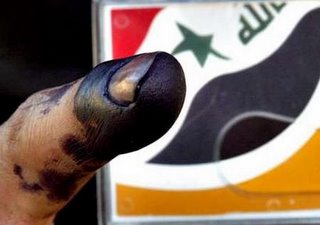"Where is the secularity and democracy we hear about? Are they only slogans?"

Women face enormous obstacles in Iraqi politics
By Huda Ahmed
Knight Ridder Newspapers
BAGHDAD, Iraq - Maha al Douri took a radical stance when she decided to run for a seat in the Iraqi Parliament in December: The 36-year-old candidate on a minor Shiite Muslim slate put her face on campaign posters - and succeeded in raising eyebrows around the country.
"I got threats," said al Douri. "I am the first (female) candidate to talk about women's rights. The political parties list women as candidates, but they want to waste the woman's voice. Where is the secularity and democracy we hear about? Are they only slogans?"
She's hardly alone in wondering what the future holds for women seeking political power in Iraq. Al Douri, who studied politics and journalism for a doctoral degree, notes that any woman getting involved must be brave enough to risk enormous social pressure and to face tremendous practical obstacles.
The official line from the government and many politicians is that women are welcome to participate. The constitution, which voters ratified in October, even guarantees women equal rights in society and a quarter of the seats in Parliament.
"We seek a real role for women, not a marginal one," said Haider al Abadi, a prominent member of Iraq's largest political coalition, the United Iraqi Alliance, a Shiite group. "Society has now accepted women in the political field. ... We are keen for women to hold leading positions in the government."
During Saddam Hussein's 25-year reign, women did have a few opportunities to play important roles in government or elsewhere in society, but only as long as they complied with Saddam's demands to serve him and the ruling Baath party. Women had the right to vote, for instance, but like all Iraqis could vote only for Saddam.
Yet for all the talk of shedding a history of female repression and establishing a nation in which a woman's voice matters as much as a man's, signs that the government is becoming more Islamist worry champions of women's rights.
Proponents of Islam in government note that the religion explicitly values women, including by cherishing their contributions to family, home and society. Yet others fear that a conservative Islamic government would bar women from voting, moving or even studying independently of their fathers, husbands or brothers.
Already there have been numerous reports of husbands casting votes in their wives' names and of fathers voting for their daughters. Before October's constitutional referendum, in conservative areas campaign posters showing a woman's face - symbolizing the face of a new Iraq - were ripped from walls or painted over and denounced as shameful.
Continues.....




0 Comments:
Post a Comment
<< Home